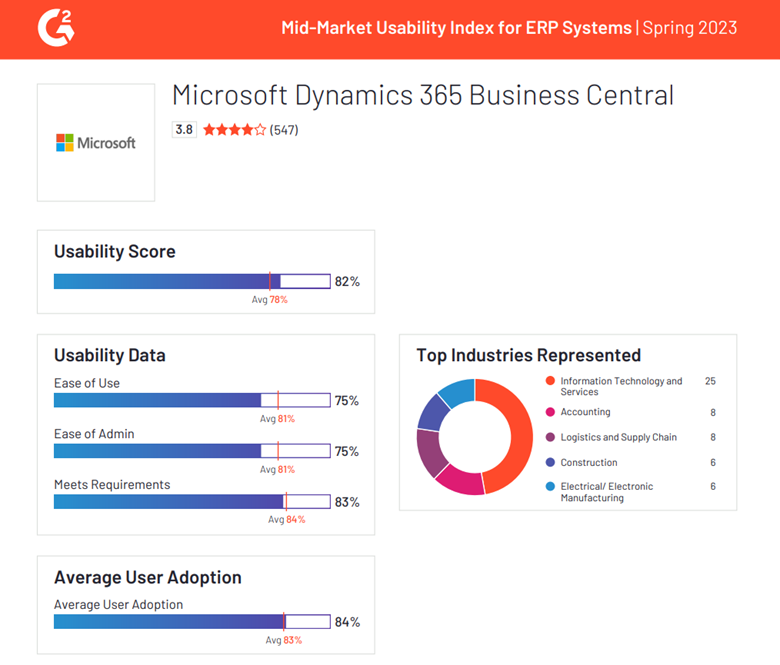Picture this for a minute: On one side, you’ve got the potential to boost productivity dramatically, on the other side, a possibly hefty price tag and potentially complex deployment might bring your business to its knees.
So, do the perks outweigh the potential potholes?
Welcome to your ultimate guide, shedding light and taking the mystery out of Dynamics 365, the good, the bad, and the difference it can make for your business.
Unveiling the Pros of Dynamics 365: Features That Make It Stand Out
This section covers:
- Expansive and comprehensive suite of features.
- Seamless integration with existing software environments.
- Designed with business growth and scalability in mind.
Dynamics 365 Features: A Comprehensive Suite for Your Business
Dynamics 365 emerges as an ideal solution for many SMBs, thanks to its comprehensive range of tools and applications. From customer service and sales to marketing and finance, this platform has something for everyone to help them succeed in their role.
Setting yourself in an all-encompassing business suite might seem daunting, there’s no denying this. However, like many cloud ERPs, Dynamics 365 simplifies this with its modular architecture. Businesses can start with what they need and add applications as their needs grow. This way, it offers a flexible as well as comprehensive solution.
But it’s not just comprehensive. The platform is known for its robust features. The AI-infused applications, the insightful analytics, the predictive insights each feature has the power to improve business productivity and foster growth.
The following success stories show how diverse organizations across different industries benefit from Dynamics 365.
Case Study 1: Campus Management Corporation: Enhancing Student Collaboration
- Industry: Computer Software for Higher Education.
- Use Case: Campus Management uses Dynamics 365 to improve collaboration with students and higher institutions. They leverage the system to identify students at risk, intervene earlier, gain insights from data, and collaborate within their team and other institutions.
- User Insights: “The combination of the Power platform, Dynamics 365, and the Accelerator is really enabling Campus Management to bring a next-generation set of features and functions to the market that are highly relevant.”
– Mark Armstrong, Chief Strategy Officer at Campus Management Corp.
Case Study 2: Toyota: Driving Efficiency and Customer Experience
- Industry: Automotive.
- Use Case: Toyota leverages Dynamics 365 to enhance operations, customer experiences, and overall efficiency. The platform helps them streamline processes and manage data effectively.
Dynamics 365 and Your Existing Software: Seamless Integration
Perhaps one of the highlighted benefits of Dynamics 365 is its seamless integration with your existing software environments. Notable for its compatibility with various platforms, it merges into your current infrastructure without causing significant disruptions.
Think about it: years of valuable customer data, design libraries, project files, they are all safely housed in your current systems. And introducing a new component might concern you about data migration, compatibility conflicts, or learning curves.
Dynamics 365 alleviates these worries. Its smooth integration means your data remains intact while still being accessible across all your applications. With its familiar Microsoft interface, your team can quickly adapt and learn to navigate through the platform.
Dynamics 365’s compatibility extends to Microsoft’s own ecosystem, including Microsoft Office 365. It leverages the advanced capabilities of Office 365, enhancing your business processes with unprecedented integration.
How this integration can revolutionize your operations
Seamless Data Flow:
- Imagine a sales team preparing for a critical client meeting. With Dynamics 365 seamlessly integrated with Office 365, they can instantly access all relevant information.
- Customer emails, Outlook appointment schedules, and shared SharePoint documents are readily available within Dynamics 365.
- This deep integration equips your team to deliver a personalized experience based on real-time updates and client preferences.
Enhanced Productivity:
- Dynamics 365 users can access CRM data directly within Office 365 applications, such as Outlook.
- Sales professionals can efficiently work on an Excel spreadsheet while promptly viewing and updating customer records within Dynamics 365.
- This integration minimizes application switching and maximizes efficiency.
Streamlined Communication:
- Sales and support teams can schedule meetings and collaborate in real-time using Microsoft Teams, all while having direct access to Dynamics 365 data.
- This boosts teamwork, enhances collaboration, and ultimately augments customer service within the Dynamics 365 ecosystem.
Improved Customer Insights:
- Imagine your marketing team launches a newsletter campaign using Office 365’s email tools.
- By integrating with Dynamics 365, you can meticulously track and analyze recipient engagement.
- Insights into email open rates, link clicks, and call-to-action responses empower you to tailor your interactions effectively and optimize campaign performance.
Automation and Workflows:
- The integration simplifies automation and workflows, encompassing customer thank-you email automation.
- This eliminates the need for manual tasks, guaranteeing prompt and personalized communication.
- The outcome is improved customer satisfaction, minimized error risks, and an overall more efficient and effective customer engagement process.
AI Integration:
- AI is creating quite a buzz, and organizations worldwide are eager to harness its potential.
- By embracing Copilot within Dynamics 365 and Office 365, you gain a competitive edge through a comprehensive approach to optimize your operations.
- Copilot, an AI-powered tool, anticipates and presents relevant client data within Dynamics 365, enriching the customer experience.
Scalable, flexible, and seamlessly integrated Dynamics 365 is nothing less than a comprehensive solution for today’s growing businesses. It offers stand features to support your business growth. Not to mention, its ability to fold into your existing software collection is commendable. While these pros paint an appealing portrayal of Dynamics 365, the platform is not without
potential downsides. Just as its strengths define its prowess, the weaknesses also weigh in the balance, influencing your decision.
Exploring the Cons of Dynamics 365: Areas for Improvement
First, a brief preview of this section:
- Dynamics 365 denting your finances? We’ll peel back the layers on pricing.
- User experience, friend or foe? We reveal if Dynamics 365 is easy to navigate.
Dynamics 365 Pricing: A Costly Affair?
Dynamics 365 holds impressive capabilities, but it may not always sit comfortably with your budget. While the software can streamline business operations and foster profitable collaborations, it demands a financial commitment that many smaller firms might strain to fulfill.
Dynamics 365 offers a range of applications tailored to various business needs, and its pricing structure reflects this versatility. The pricing model caters to businesses of all sizes, with costs varying depending on the specific applications and services chosen. For instance, the first application a business subscribes to has a set price, and any subsequent qualifying applications are available at a reduced rate. This encourages businesses to use a suite of interconnected tools for a comprehensive business solution.
For small and medium-sized businesses, Dynamics 365 Business Central Essentials starts at $70 per user per month, while the Premium version is $100 per user per month. The pricing for professional services like Customer Service Professional and Sales Professional is $50 and $65 per user per month, respectively, with subsequent qualifying applications available for $20 per user per month. Larger-scale applications, such as Finance and Supply Chain Management, start at $180 per user per month, with the premium versions of these applications costing more.
Dynamics 365 Pros and Cons: Pricing
Here’s a breakdown of key points to consider when deciding whether Dynamics 365 is a good fit for your business’ budget.
| Dynamics 365 Pricing Pros | Dynamics 365 Pricing Cons |
|---|---|
|
|
For detailed and up-to-date pricing information, consult the official Dynamics 365 pricing page.
User Experience: Is Dynamics 365 User-Friendly?
A grind to understand or a walk in the park? The user experience of Dynamics 365 is critical in determining its usability within a workforce. With a broad ambit of capabilities, the platform may appear complex for non-technical users or those transitioning from simpler, less comprehensive systems.
For the uninitiated, the user interface, dotted with tabs, buttons, and controls, can be challenging to navigate. This complexity requires employees to undergo training, which requires time and funds, turning into another hidden cost of Dynamics 365.
ERP Industry Analyst’s Take on Dynamics 365 Usability
Each year, well known software analyst company G2 reviews the top ERPs in terms of their usability. The report ranks each system on a variety of factors, including overall usability, ease of use, making use of administration, how well the system meets user requirements, and average user adoption rate. Below is a snapshot of Dynamics 365 rankings in the Midmarket Usability Index for ERP Systems–Spring 2023.

As you can see, Dynamics 365 certainly has room for improvement in some of these areas, but is far from the worst performer. Many of these factors are subjective and as the user feedback you’ll see below illustrates, there is a lot to like about Dynamics 365 in terms of usability, and some things that frustrate users. When considering whether Dynamics 365 may be the right ERP solution for your business, ask yourself is, “how familiar is my team with Microsoft products? Do we rely heavily on them in our business?”
If your users are already familiar with other Microsoft products and your business relies on them, Dynamics 365 is often a good choice because the user interfaces offer similarities that help to shorten the learning curve and the products integrate easily with one another.
Real Users Weigh In
| “The software’s integration with other Microsoft tools is seamless. However, some modules lack intuitive design, which can slow down adoption for new users.” | “Microsoft Dynamics 365 is a great way to run an organization as an ERP system. It adds a lot of value by connecting all units within the organization. However, there is a learning curve associated with it.” | “Dynamics 365 has a comprehensive suite of features, but the initial setup and customization can be overwhelming. Once you get past that, it becomes easier to navigate.” |
Dynamics 365 Support: A Lifeline or a Letdown?
Rightly so, many users consider the quality of technical support as one of their deciding factors when selecting ERP software. Does Dynamics 365 prioritize quality? Let’s see how Microsoft compares to other top ERP vendors in terms of the quality of support they deliver.
| Vendor | SAP | Oracle NetSuite | Infor Cloud Suite | Epicor | Microsoft | Acumatica |
|---|---|---|---|---|---|---|
| Types of tech support offered | SAP offers comprehensive tech support through various channels, including phone, email, and online portals. | NetSuite provides 24/7 support via phone, chat and email. | Infor offers support through a dedicated team. | Epicor provides phone and online support. | Microsoft offers omni-channel support, including digital messaging and voice. This is besides support offered by Dynamics 365 implementation consultants. | Acumatica offers phone and email support besides support offered by implementation experts. They are generally the first line of support for users. |
| Strengths | Known for its extensive knowledge base, SAP provides timely responses and personalized help. | Users appreciate NetSuite responsiveness and knowledgeable support staff. | Users find their support responsive and helpful. | Users appreciate the knowledgeable support team. | Responsive support, especially with additional paid options. | Knowledgeable partner ecosystem and robust self-service support options. |
| Weaknesses | Some users find SAP’s support complex and occasionally slow. | Some users report delays in resolution. | There are limited self-service options. | Some users report response delays. | Some users may find support costly. | Quality of support often depends on the implementation consultant users choose to work with. If they choose to seek support from Acumatica directly, this comes at an additional cost. |
| Overall impressions | SAP tech support is robust but requires familiarity with their ecosystem. | NetSuite support is reliable, especially for a cloud-based ERP. | Overall, Infor’s support is satisfactory, but it could improve its self-help resources. | Overall, Epicor’s support is reliable. | Microsoft support is robust and backed by Gartner recognition | Acumatica support is knowledgeable and helpful, backed by many analyst awards for usability and support. |
The Importance of Choosing the Right Dynamics 365 Implementation Consultant
As a Dynamics 365 user, most of the time your Microsoft partner will be your first line of defense when you need help with the software. So, finding one that offers strong, responsive support after the sale defines how successful you will be with the software.
Be wary of sales teams that focus too much on getting you to sign on the dotted line without first explaining to you the support options they offer. But don’t just stop there. Request customer references. Ask them how long they have been working with the implementation consultant company, and about their impressions of the support they receive from the implementation consultant.
If references are not readily available, customer testimonials on their and other websites, like Google, G2, software advice etc. can give you a glimpse into what working with a particular Microsoft partner will be like.
For more on what to look for in your Dynamics 365 consultant, download our ERP implementation partner interview checklist.
Understanding Dynamics 365: A Comprehensive Overview
- Discover what Dynamics 365 is and its significance.
- Identify the ideal audience for Dynamics 365.
- Contrast Dynamics 365 against other ERP software in the market.
What is Dynamics 365?
Microsoft Dynamics 365 is a suite of enterprise resource planning (ERP) and customer relationship management (CRM) applications, meant to offer an all-in-one business solution.
Dynamics 365 combines CRM and ERP capabilities in a single, cloud-based platform, eliminating the need for businesses to use separate applications for these functions. Its purpose is to make business processes more efficient and automated, offer useful insights, and encourage teamwork among different teams. It aims to empower businesses to deliver better results through predictive insights, centralized data, and transformative processes.
Who Should Use Dynamics 365?
It is important to note that businesses of all sizes can benefit from the features of Dynamics 365, not just large corporations. In fact, businesses of all sizes can benefit from the features of this software. Regardless of business size, it caters to businesses with diverse needs, including finance, sales, marketing, and customer service.
The platform offers scalability and flexibility, making it suitable for small businesses that aspire to grow, and for large organizations aiming for efficiency and digital transformation. Overall, businesses seeking a robust, all-in-one solution to manage their vital business operations like sales, customer service, field service, operations, finance, and marketing, are the prime users of Dynamics 365.
Dynamics 365 vs. Other ERP Software: A Comparative Analysis
Dynamics 365 stacks up differently against other ERP software in the market. While they all aim to streamline business processes, the way they deliver can significantly differ.
| ERP Platform | Strengths | Weaknesses |
|---|---|---|
| Microsoft Dynamics 365 |
|
|
| SAP |
|
|
| Oracle NetSuite |
|
|
| Infor CloudSuite |
|
|
| Epicor ERP |
|
|
| Acumatica |
|
|
Additionally, unique features such as seamless integration with other Microsoft products (like Office 365 and LinkedIn) and a strong focus on AI and Machine learning make Dynamics 365 stand out. It fares well in terms of customizability and scalability, too. Still, nothing is universal. Depending on the business’ need, other ERP solutions might serve a better purpose. We strongly recommend conducting a detailed comparison of specific ERPs based on business requirements. Here’s another checklist to help with that.
Parting Thoughts on Dynamics 365
Dynamics 365 offers robust capabilities, seamless integration, and analytical prowess, yet the cost and complexity may deter some. It’s distinctly valuable for large-scale organizations seeking streamlined operation, but smaller businesses might find it excessive.
It is important for companies to never take meaningful decisions about their infrastructure lightly. Dynamics 365, with all its potential advantages matched with just as vital drawbacks, is neither a clear ‘yes’ nor an outright ‘no.’ Your decision hinges on your organization’s specific needs, goals, and resources at hand.
As we reflect upon the discussion, we suggest you take a beat, re-evaluate your operational requirements, and measure them against the pros and cons we’ve covered here.
If you need help to decide, schedule a one-on-one consultation with our ERP experts. With over 30 years of experience in the ERP industry, we are ready to help you make sense of your options and find a solution that fits your needs and budget.



